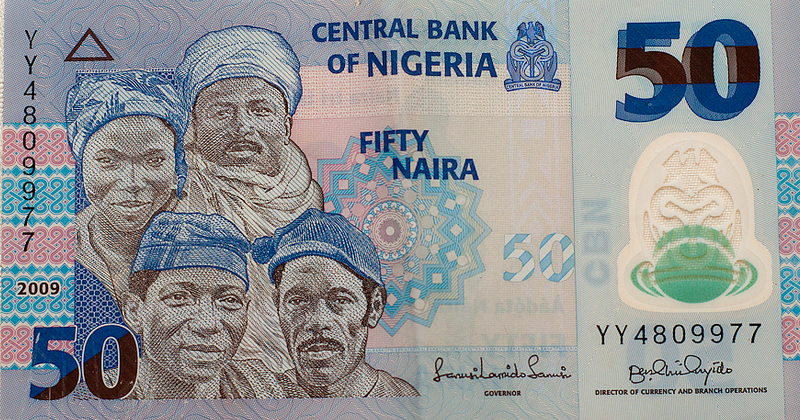
Nigerian Naira. Photo by Shardayyy via Flickr (CC BY 2.0)
Nigerian lawmakers are deliberating over multiple bills of law that aim to fight cybercrime — but could gag government critics along the way.
“An Act To Provide For The Prohibition of Electronic Fraud In All Electronic Transactions In Nigeria And For Other Related Matters” [SB198, Year: 2008] would target various forms of fraud and financial crimes carried out online or via mobile phones. Initially sponsored by Ayo Arise, a Senator in the 6th National Assembly of Nigeria, the bill's original draft provided long prison terms (of five to 14 years) for violators of the law.
The bill's new sponsor, Senator Sefiu Adegbenga Kaka of the 7th National Assembly, has promised to excise “any unacceptable clause(s) in the proposed bill.”
This bill's prohibitions on electronic fraud are broadly articulated and cover activities ranging from accessing electronic devices “without authorization” to “trafficking” passwords:
Prohibition of Electronic Fraud
(1) From the commencement of this Act no person or body corporate shall:
- Without authorisation access a computer (or) and other electronic devices or in case of authorisation, exceeds authorised access to computers and or communication devices;
- use counterfeit access devices;
- use unauthorised access devices;
- possess any device designed to manipulate credit or ATM card;
- damage a government computer with the intent to defraud;
- access computer and or electronic device to commit espionage:
- traffic in pass words for public, private and or financial institutions computer or relevant electronic devices;
- traffic in any password or similar information through which a computer may be accessed without authorisation with intent to defraud, copy financial institutions website, email customers with intention to defraud customers and financial institutions; and
- Intentionally create computer worms to destroy government computer.
(2) Anybody who contravenes any of the subsections above shall be guilty of an offence punishable with a sentence of 7 years imprisonment or a fine of 5 million Naira or both.
The section of the bill that has drawn the ire of netizens addresses “false” information:
Section 16 (3): Anyone who intentionally propagate false information that could threaten the security of the country or that is capable of inciting the general public against the government through electronic message shall be guilty of a felony and upon conviction shall be sentenced to 7 years imprisonment or 5 million Naira fine or both.
Without question, this section of the law could be used to criminalize critical speech, calls for protest, and other forms of political activism. Nevertheless, some influential members of the tech community see value in the measure. Blossom Nnodim, creator of the AdoptATweep social media and entrepreneurship project, thinks that “false information” is the operative word in the bill. Nnolim believes that while freedom of speech should be sacrosanct, there must be regulations against defamation or peddling of false news.
The bill could effectively impede Snowden-style disclosures of classified documents with the following sanctions:
Tampering with protected computers
9. From the commencement of this Act, any person who being employed by or under Local, State or Federal Government of Nigeria with respect to working with any protected computer, electronic mails commits any act which he is not authorized to do by virtue of his contract of service or intentionally permits, tampering with such Computer, is guilty of a felony and is liable to imprisonment for three years.
Obtaining electronic messages
11. Any person or organisation who by means of false pretence induces government of Nigeria or any person in charge of electronic devices to deliver to him any electronic messages which includes but is not limited to E-mail messages, credit and debit cards information, facsimile messages which is not specifically meant for him or his organisation (in the latter case except he is authorised to receive such messages for and on behalf of his organisation) is guilty of a misdemeanour and is liable to imprisonment for two year or a fine of no more than 1 million Naira or both.
‘Gbenga Sesan, Executive Director of Paradigm Initiative Nigeria, drew Global Voices’ attention to what he described as a greater potential threat to online freedom in Nigeria — the Cyber Crime Bill (2013) — which is currently in the National Assembly.
Why is the Cyber Crime Bill a grave threat to free speech? Sesan explains:
The new Cyber Crime Bill (2013) has gone through various drafts, including having been known as Cyber-Security Bill (2011) at some point. The bill was jointly authored by the… wait for it… National Security Adviser's office and the Ministry of Justice. It had some provisions such as security agents having the power to seize equipment based on reasonable suspicion but this has since been improved to include the need for a court warrant. The problem with this in the Nigerian context is that warrants are easy to obtain since the judiciary isn't exactly an institution that activists or ordinary internet users can rely on. In fact, there's a joke that for the Nigerian judiciary, “the rich get bail but the poor get jail.”
Sesan fears the bill tips the scales in favor of security agencies and could be used to target critical voices online. However, he suspects it may end up on the shelf with 2015 elections not too far off.
This is not the first time Nigeria has come under scrutiny for restrictive Internet-related policymaking. In July 2012, we reported on calls from the President of the Nigerian Senate for social media censorship. Earlier this year, we looked into government plans to ramp up Internet surveillance using software purchased from Elbit Systems, an Israeli company.
Update [December 11, 2013]
The Nigerian Senate bowed to public criticism and has expunged the offensive section from the proposed bill.




11 comments